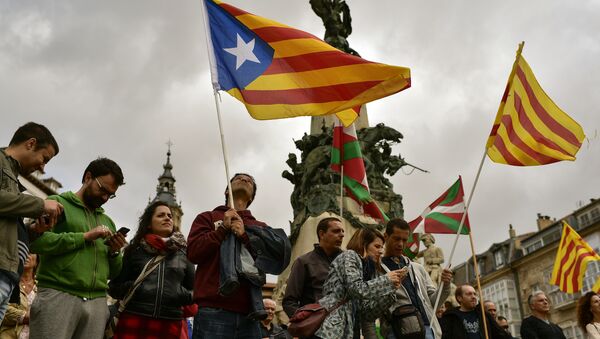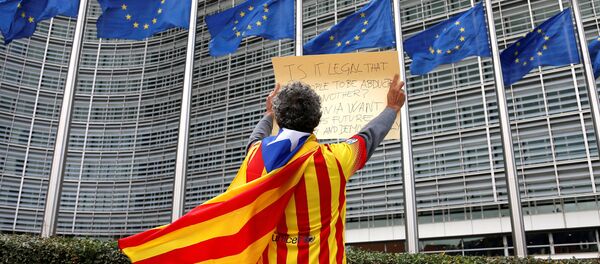Kristian Rouz – Political turmoil in Spain has produced significant economic risks in the Eurozone, rendering the European Central Bank (ECB) dovish on policy. The ongoing standoff over the proposed independence of Catalonia has affected business confidence and investor sentiment across the single-currency bloc.
The political turmoil in Catalonia hit its boiling point Friday, when the Catalan parliament declared independence following a secret vote, with the Spanish cabinet reacting by formally removing the region’s government and setting a new election for 21 December.
READ MORE: Catalan Situation 'Not a Vanity-Type of Secession, Self-Determination'
Just one day prior, the ECB concluded its policy meeting, extending its asset-purchasing program through September 2018. However, it reduced the scale of bond purchases by half to 30 bln euros worth of debt securities per month.
"The dovish surprise from the ECB was its openness to extend the duration of its bond purchase program," Omer Esiner of Washington-based Commonwealth Foreign Exchange said.
Subsequently, market participants said they are not expecting the ECB to start raising its base borrowing costs until 2019, while the US Federal Reserve and the Bank of England (BOE) are explicitly on the tightening side in their respective approach to monetary policies.
The Eurozone economy appeared to slow in October, despite the private sector accelerating its pace of hiring, and inflation continued its gradual recovery from the post-debt crisis near-zero readings earlier this decade.
The main challenge, however, remains, as the Eurozone’s unity is becoming increasingly questionable.
"Firms don't appear to have been unduly affected by recent euro strength, with the growth of new export orders accelerating in October," Andrew Harker of IHS Markit said. "Healthy demand in export markets appears to be outweighing any negative currency impacts."
A weaker euro would now spur the bloc’s exports, benefitting the German manufacturers, whose private sector has already posted its six-and-a-half-year strongest increase in new orders.
HIS Markit’s composite Purchasing Managers’ Index (PMI) for the Eurozone dropped to 55.9 in October from 56.7 the previous month, which is still above 50 – a threshold between expansion and contraction.
"Based on the German and French figures, the average PMI for Spain and Italy probably fell, perhaps because issues in Catalonia weighed on business activity in Spain," Stephen Brown of Capital Economics said.
"Despite declining in October, the eurozone Composite PMI suggests that economic recovery continued at a healthy pace at the start of Q4," he added.
Italy, in the meantime, is still experiencing hard times with its undercapitalized banking sector. The recent drive for autonomy in its northern regions of Veneto and Lombardy adds to the political fragility of the Eurozone.
The same applies to Italy’s Lombardy and Veneto, which – like Catalonia – are heavily industrialized regions, and are carrying a fiscal burden by supporting the less-developed regions within their nation.
All in all, the Eurozone’s economic recovery is challenged by increasing political instability and regional ambitions for wider self-governance. These stem from the Southern Europe’s common disease of high debt-to-GDP ratios, which affect Spain, Italy, and, most prominently, Greece.
"While the price components of the PMI survey picked up in October, they are still subdued by past standards," Capital Economics’ Brown says. "So alongside a tapering announcement we expect the ECB to strengthen its forward guidance to indicate that interest rates are unlikely to rise until 2019."






